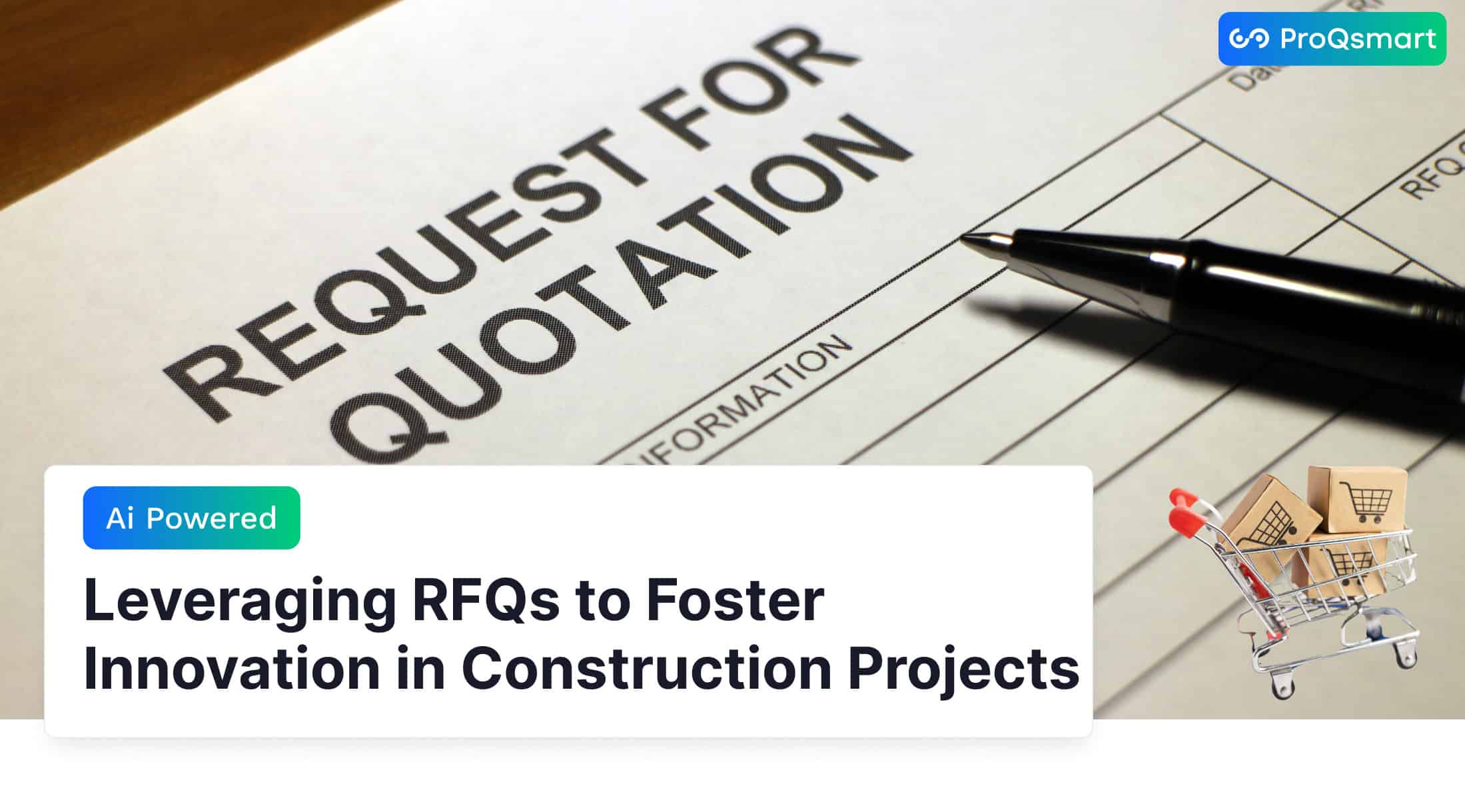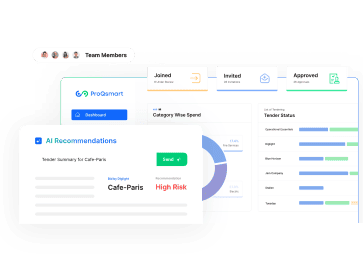Innovation is a vital force in the construction industry, and leveraging Requests for Quotations (RFQs) strategically can enhance this progress. By prioritizing innovation in RFQ design, project stakeholders can encourage new ideas that lead to faster and more efficient project delivery.
RFQs can transform conventional approaches by inviting creative solutions that address challenges and promote a culture of innovation. Technology, including digital platforms and artificial intelligence, plays a crucial role in streamlining the RFQ process, improving efficiency and transparency.
Ultimately, well-crafted RFQs are not just requests for pricing; they are calls for revolutionary solutions in construction, positioning organizations at the forefront of industry advancements.
What is an RFQ in Construction?
An RFQ, or Request for Qualifications, is a crucial document in the construction industry that allows project owners to evaluate the capabilities of contractors before any bidding occurs. By mastering the details of RFQs, project stakeholders can significantly enhance their approach to construction projects, leading to greater success.
The primary goal of an RFQ is to prequalify contractors based on their skills, experience, and qualifications. This document is sent by project owners to ensure they select the most capable and reliable companies for their construction jobs, effectively serving as a pre-screening process. Contractors respond with a Statement of Qualifications (SOQ) to demonstrate that they meet the project’s requirements. This step is essential for avoiding potential pitfalls by ensuring that only qualified contractors are considered for the project.
Key Difference Between RFQ and RFP
|
Aspect |
Request for Quotation (RFQ) |
Request for Proposals (RFP) |
|
Focus |
Primarily assesses a contractor’s qualifications and pricing. |
Delves into project specifics and solicits detailed proposals. |
|
Purpose |
Verifies credentials and gathers pricing before bidding occurs. |
Seeks comprehensive project plans, methodologies, and pricing details. |
|
Detail Level |
Provides an overview of potential candidates and their costs. |
Involves intricate details of project execution and approach. |
|
Example Scenario |
Ensures contractors have relevant experience and competitive quotes for a community center project. |
Requests specific methodologies, timelines, and costs for the same project. |
|
Outcome |
Filters out unqualified candidates while obtaining price estimates. |
Evaluates detailed proposals to select the best approach for project execution. |
Key Components of an Effective RFQ
To create an effective RFQ, certain key components should be included:
Project Description: A clear outline of what the project entails.
Qualifications Required: Specific credentials or experience needed from contractors.
Submission Guidelines: Detailed instructions on how to submit qualifications.
Evaluation Criteria: Criteria for assessing contractor qualifications.
Having these components clearly defined helps streamline the selection process and ensures that contractors understand what is expected.
Importance of Specificity
Specificity in RFQs is vital to prevent misunderstandings during the bidding process. When project owners articulate their needs clearly, they attract qualified contractors who align with the project’s requirements. Vague RFQs can lead to procurement inefficiencies and result in unsuitable contractor responses, wasting time and resources.
Characteristics of Effective RFQs
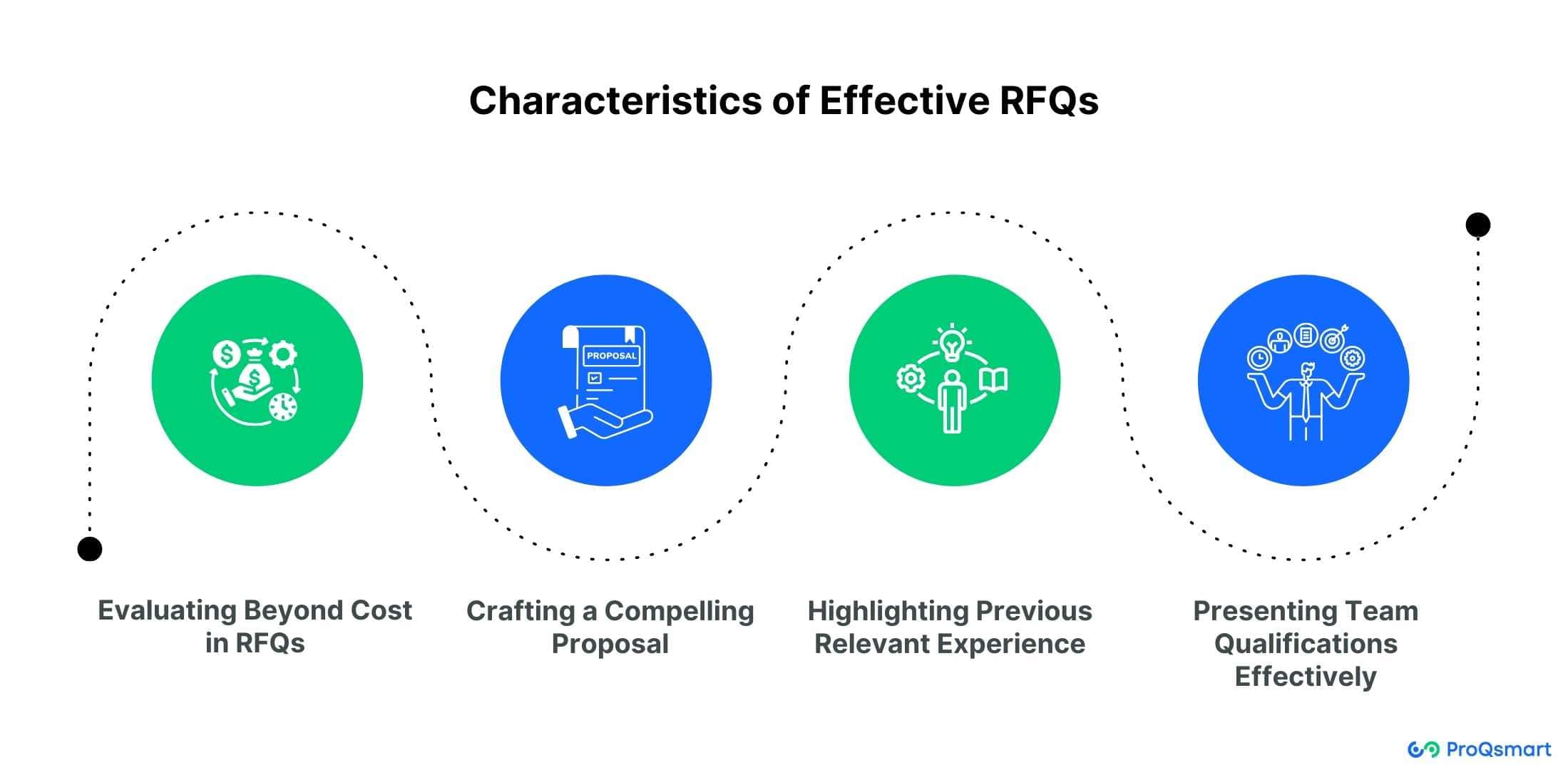
Creating a good RFQ for the construction industry requires careful consideration. Let’s unpack what comprises a good RFQ.
Evaluating Beyond Cost in RFQs
When evaluating RFQs, looking beyond just the price tag can be a game-changer. Consider experience, quality, and past performance. For example, in construction projects, a contractor with proven success in similar projects could save time and costs in the long run.
A holistic evaluation approach helps in selecting the right contractor, leading to a successful project. Focusing only on cost can be risky. It might lead to choosing a cheaper option that compromises quality.
Imagine hiring an inexperienced team to save money, only to face delays and additional costs later. That’s why considering all factors is important for project success.
Crafting a Compelling Proposal
For contractors, standing out in the RFQ process is essential. Start by tailoring proposals to the specific project. Don’t just send a generic response. Show you understand the project’s needs and objectives.
Including a unique value proposition can make your proposal shine. What’s your edge over the competition? Maybe it’s your speed in completing takeoffs, allowing you to quote customers faster. Demonstrating this can make a big difference.
Remember, it’s not just about fitting the requirements; it’s about showing why you’re the best fit.
Highlighting Previous Relevant Experience
A strong proposal showcases relevant past experience. Highlight projects that closely align with the current RFQ. Demonstrating successful outcomes and client satisfaction builds trust.
Use case studies or testimonials to strengthen your proposal. These real-world examples show your capability and reliability. For instance, if you’ve managed a similar project, sharing how you navigated challenges and delivered results can impress potential clients.
Presenting Team Qualifications Effectively
Of course, the team behind the project is as important as the proposal itself. Clearly lay out your team’s qualifications and expertise. Include resumes and certifications to support your claims.
A powerful team adds credibility. Showcasing your people, methodology, and past experience helps to showcase your strength. Consulting firms should be looking at these areas.
Talking to clients one-on-one can even drive home the value of the team, building trust and preserving profit. A good decision saves millions, so remember to make sure the team is part of that decision.
Leveraging RFQs for Innovation
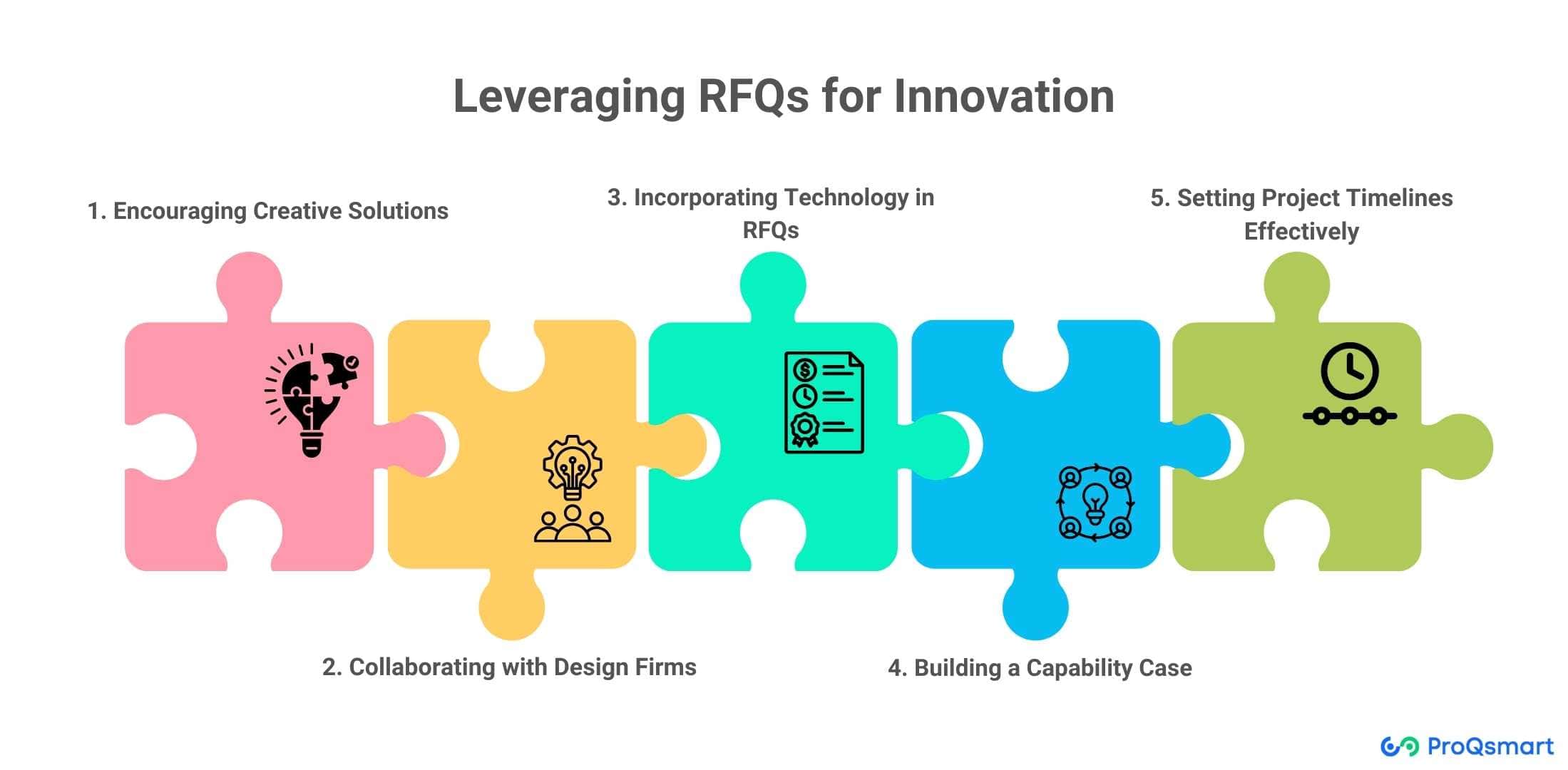
1. Encouraging Creative Solutions
Using RFQs (Request for Quotations) in construction is much more than a price tag. It’s about making opportunities for growth. Project owners can frame RFQs to invite contractors to think outside the box.
Begin with open-ended questions that allow contractors to reveal their distinct methods. Instead of looking for a solution that will be the same as the next, you ask one simple question — “What creative techniques can you employ to make this project sustainable?” This approach breeds creativity and new ideas.
It encourages contractors to submit state-of-the-art ideas, such as utilizing sustainable materials or innovative building practices. Take, for example, a project where contractors were told to integrate AI to optimize energy use in a new building. The result was a design so radical that it drove down costs and primed the pump.
This demonstrates how a great RFQ can turn an ordinary building project into a hotbed of inspiration.
2. Collaborating with Design Firms
Engaging the design firms early during the RFQ stage helps bring out creativity and innovation. When design experts collaborate with project owners and contractors, the result can be proposals that shine.
The partnership means you receive more holistic ideas, combining style with substance, which is important in contemporary construction projects. For example, incorporating design feedback can help finetune an RFQ to better reflect architectural trends or sustainability objectives.
When you invite input from these teams while creating RFQs, you can generate innovative ideas. This collaboration results in proposals that are practical and perfectly tailored to the project vision.
3. Incorporating Technology in RFQs
It’s not just smart to use technology in the RFQ process; it’s essential. Tools like ConWize construction estimation software can simplify the process, allowing you to organize and review responses more efficiently.
These tools enhance communication and help you pull in robust data, trimming the 75% of compatibility problems businesses face with traditional methods. Embracing AI and automation can also boost transparency and efficiency.
For example, we can automate ranking applications based on predefined criteria, ensuring the process is fair. This integration of technology ensures you’re not only choosing the right contractor but also cultivating a smoother, more transparent relationship.
4. Building a Capability Case
Within their RFQ responses, contractors should develop a strong capability case. This means clearly aligning their strengths with project requirements.
Showcasing previous victories and how their skills fit the project’s requirements can help them stand out in a crowded space. An articulable capability case highlights a contractor’s experience with particular technologies.
It also shows that they have a history of projects that finish in a timely fashion and within budget. This in-depth alignment enables project owners to make smarter sourcing decisions and reduces the chances that vendors will not be compatible.
5. Setting Project Timelines Effectively
Making clear, realistic timelines in RFQs is essential. It helps with expectations and planning, keeping contractors and project owners on the same page.
By communicating critical deadlines upfront, contractors can tailor their proposals accordingly. This ensures they align their schedules with the project, leading to a more organized and efficient process.
Best Practices for Crafting Innovative RFQs
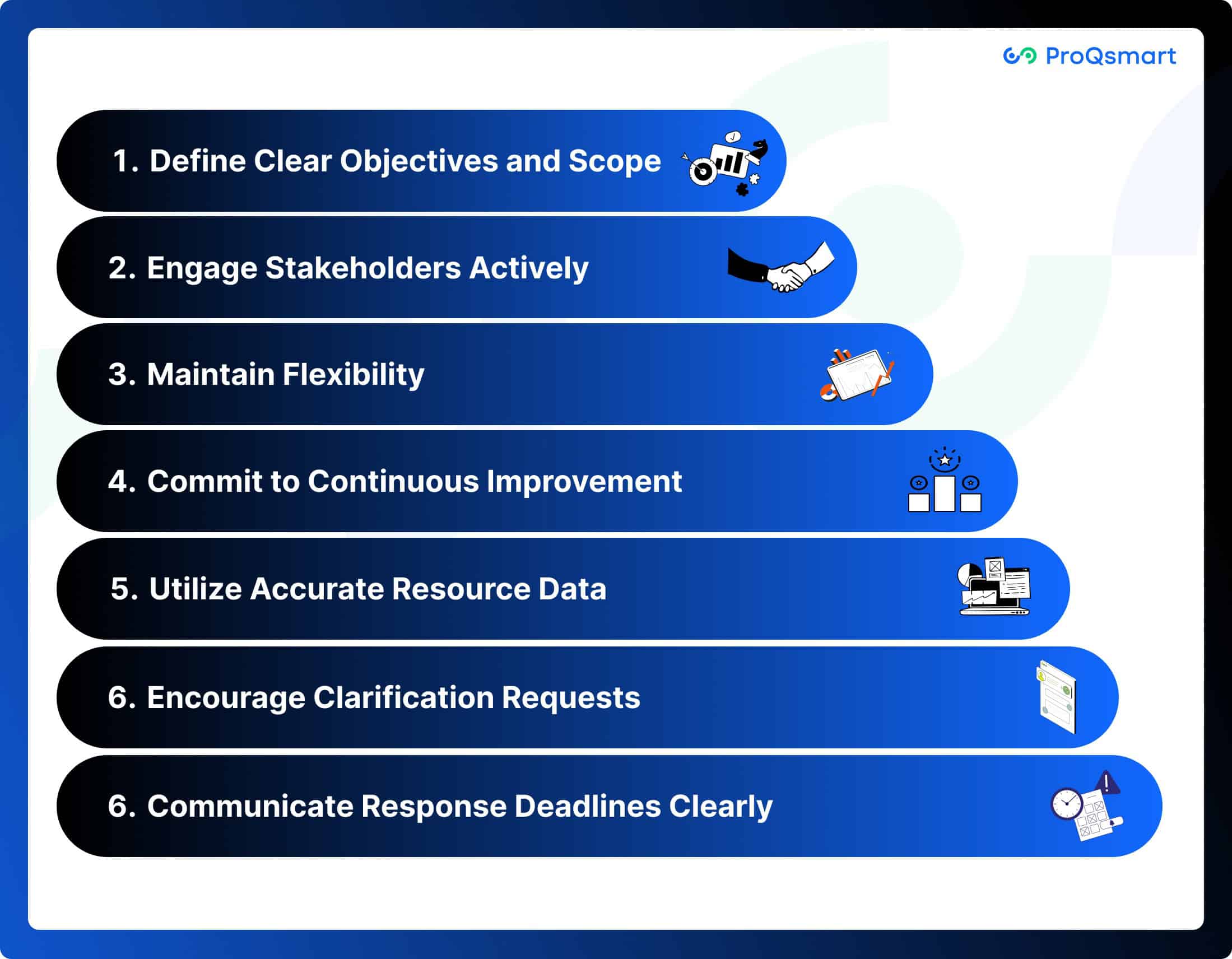
Creating an effective Request for Quotation (RFQ) in the construction industry involves careful planning and attention to detail. Here are key practices to enhance the RFQ process and foster collaboration among stakeholders:
1. Define Clear Objectives and Scope
Establish specific goals for the project, outlining what you aim to achieve.
Provide comprehensive details about project requirements, including deliverables, deadlines, and milestones. This clarity helps contractors tailor their proposals effectively and reduces misunderstandings.
2. Engage Stakeholders Actively
Involve relevant parties, such as team members and external experts, in the planning phase to gather diverse perspectives.
Encourage feedback throughout the RFQ process to enhance the quality of the final document and ensure all needs are addressed.
3. Maintain Flexibility
Allow room for innovative suggestions from contractors by keeping the RFQ adaptable.
Be open to adjustments based on new insights or ideas that may emerge during discussions.
4. Commit to Continuous Improvement
Use lessons learned from previous projects to refine your RFQ approach.
Regularly update your RFQ templates based on contractor feedback and past experiences to improve clarity and effectiveness.
5. Utilize Accurate Resource Data
Make data-driven decisions by using current information about available resources, such as equipment and labor.
Leverage construction management software to streamline data collection, ensuring that your RFQ reflects realistic expectations.
6. Encourage Clarification Requests
Foster an environment where contractors feel comfortable asking for clarification on RFQ requirements.
Promote open communication to build trust and ensure that proposals align with project goals, minimizing the risk of costly misunderstandings.
7. Communicate Response Deadlines Clearly
Clearly specify submission deadlines in the RFQ to keep the procurement process on track.
Utilize RFP management software to streamline submissions and maintain organization, ensuring that all parties adhere to timelines.
How Technology Facilitates Innovation in RFQ Process
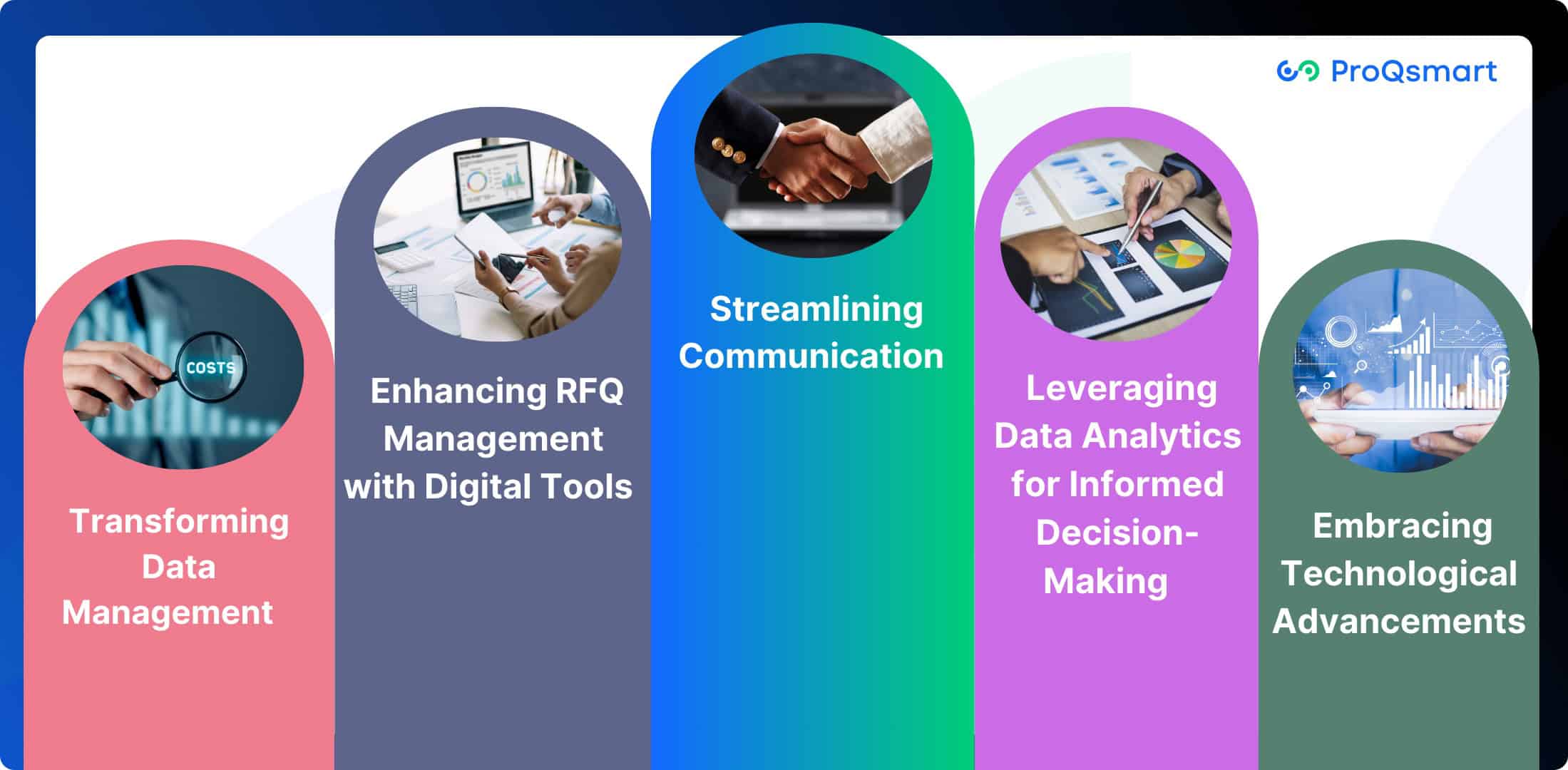
In construction industry, technology plays a pivotal role in fostering innovation and enhancing project management, particularly in the Request for Quotation (RFQ) process. By leveraging the right technological tools, organizations can significantly improve data management and streamline operations.
Transforming Data Management
Effective project management hinges on the ability to handle data efficiently. Technology serves as a trusted ally in this regard, transforming the RFQ process by ensuring that project data is well-organized, readily accessible, and consistently up to date. With tools like ProQsmart, you can automate data entry and storage, minimizing the risk of human error and increasing overall efficiency. This automation allows for better tracking of RFQ submissions, ensuring that no critical information slips through the cracks.
Enhancing RFQ Management with Digital Tools
Digital tools revolutionize how RFQs are managed by providing real-time tracking of submissions and responses. This transparency allows project owners to know exactly when contractors submit their quotes and facilitates prompt management of replies. Key benefits of using digital tools include:
Real-Time Tracking: Monitor RFQ submissions and responses as they happen.
Centralized Communication: Utilize platforms to streamline communication between project owners and contractors, ensuring everyone is aligned on project requirements.
Streamlining Communication
Clear communication is essential for the success of any project, especially during the RFQ process. Technology simplifies this communication by providing a centralized platform for all interactions related to RFQs. This setup allows for easy tracking of everything from initial inquiries to final decisions, reducing misunderstandings and accelerating the decision-making process.
Leveraging Data Analytics for Informed Decision-Making
Data analytics is a powerful tool for evaluating contractor responses. By utilizing analytics software, organizations can gain valuable insights into contractor capabilities, historical performance, and potential risks. This analysis goes beyond merely identifying the lowest bid; it helps project owners understand which contractors are best suited for their specific needs.Reviewing past project data can reveal opportunities for improvement in future RFQ processes. Companies that effectively harness data-driven insights—often through AI and machine learning—are significantly more likely to make informed decisions that enhance procurement outcomes.
Embracing Technological Advancements
As the construction industry continues to adopt new technologies, it is also witnessing shifts in business models and services. Innovations such as AI are projected to substantially increase industry profits by 2035. Additionally, the growing interest in blockchain technology offers new efficiencies by providing transparent records of every transaction, thereby enhancing trust among stakeholders. The integration of these technologies not only leads to better project outcomes but also results in significant cost savings. As organizations embrace innovation in their RFQ processes, they position themselves for success in an increasingly competitive landscape.
Tips for Efficient RFQ Management
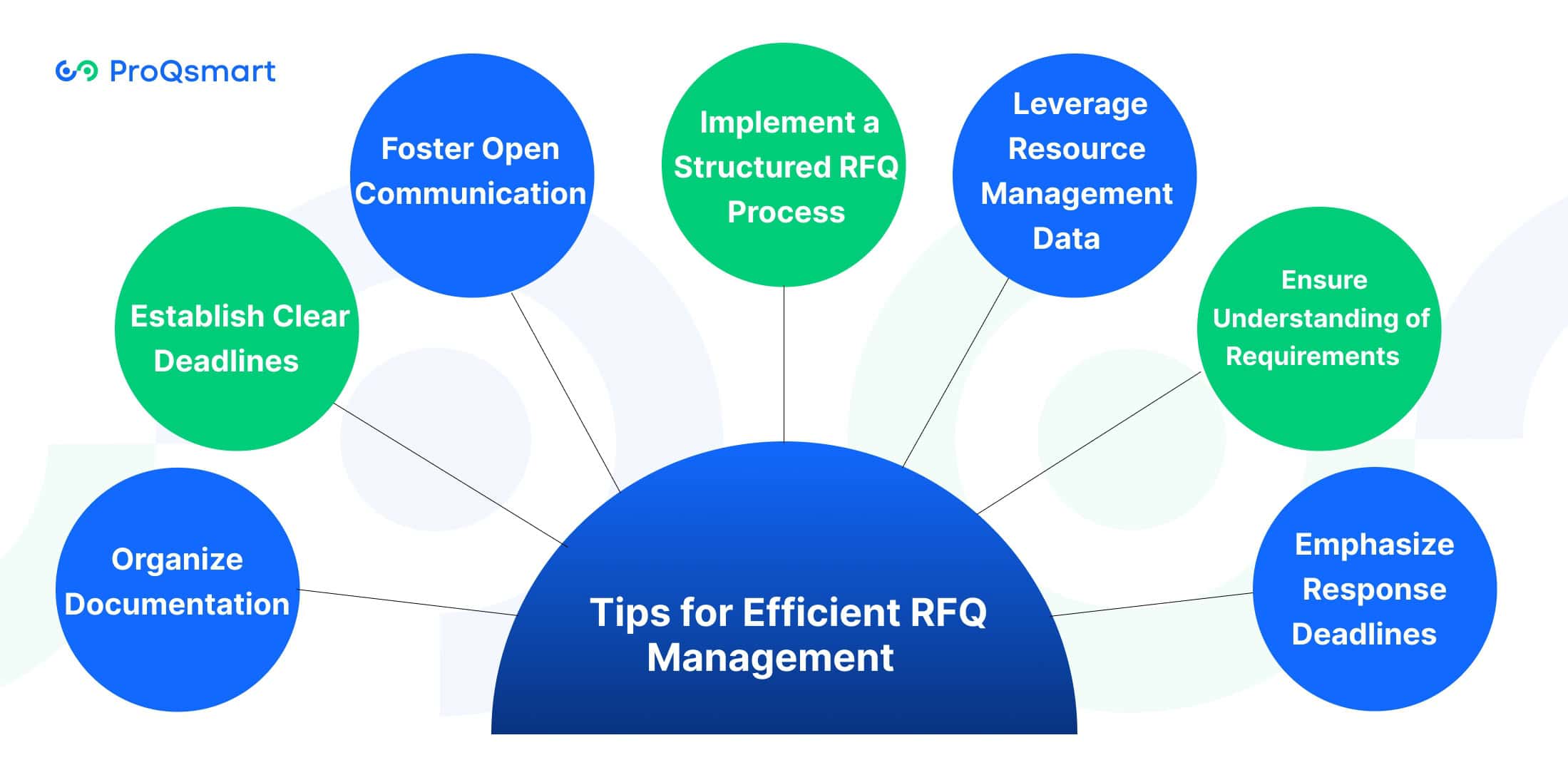
Managing Requests for Quotation (RFQs) in construction can be challenging, but with a systematic approach, the process can become more manageable. Here are some effective strategies to streamline RFQ management:
Organize Documentation
Keeping your RFQ documents neat and well-structured is essential for clarity. Clearly state the evaluation criteria and provide detailed instructions for the Statement of Qualifications (SOQ). Including easy-to-fill-out forms for vendors ensures that everyone involved understands what is required, reducing the likelihood of confusion and errors.
Establish Clear Deadlines
Setting and communicating specific deadlines for RFQ submissions is crucial. By establishing clear timelines, you help keep all parties on track and ensure timely responses, which are critical for maintaining project schedules. This proactive approach minimizes delays and allows for a smoother procurement process.
Foster Open Communication
Open channels of communication are vital for successful RFQ management. Encouraging regular check-ins and discussions with all stakeholders helps clarify any misunderstandings and aligns expectations. This ongoing dialogue can lead to better proposals and a more collaborative atmosphere throughout the RFQ process.
Implement a Structured RFQ Process
A structured RFQ process not only simplifies your workload but also facilitates smoother procurement. Effective management can save valuable time in project execution and help you select the right contractor. Utilizing technology, such as ProQsmart, can enhance this process by providing optimized dashboards that allow you to oversee RFQs from any device, ensuring that nothing is overlooked.
Leverage Resource Management Data
Resource management data is invaluable for making informed decisions about RFQ requirements. By utilizing accurate and up-to-date information, you can ensure that every bid aligns with project specifications. Regularly updating this resource information is vital for proper RFQ management, allowing you to tailor your approach based on insights gained from the data.
Ensure Understanding of Requirements
It is crucial that all stakeholders fully understand the RFQ requirements to avoid misunderstandings that can hinder project progress. Promoting collaboration through regular meetings encourages discussions about expectations and clarifies any uncertainties. This proactive engagement helps create stronger proposals and fosters a more efficient selection process.
Emphasize Response Deadlines
Clearly communicating response deadlines in your RFQ is essential. Timely submissions can significantly impact project timelines and contractor selection, so allowing contractors adequate time to prepare detailed responses enhances the quality of submissions. Utilizing digital tools for RFQ management can streamline the issuance of documents and provide direct access to vendors, ensuring everything remains organized and on schedule.
By implementing these strategies, you can create a more efficient RFQ management process that simplifies your workload while leading to better contractor selection and successful project outcomes in the construction industry.
Conclusion
Diving into the world of Requests for Quotation (RFQs) in construction opens up a toolbox full of opportunities. By effectively managing RFQs, you can drive innovation, enhance efficiency, and create meaningful change within your projects. It’s essential to view RFQs not merely as administrative tasks but as catalysts for better solutions.
Leveraging technology is crucial in this journey. Utilizing tools like ProQsmart can help you organize, curate, and generate the necessary data to streamline the RFQ process. This approach allows you to make your RFQs clearer and more straightforward, illuminating the path toward successful project execution.
As you embark on this process, remember that clear and simple RFQs can serve as a guiding light for all stakeholders involved. They set expectations, foster collaboration, and ultimately lead to superior outcomes. Now is the time to take action—craft RFQs that articulate your vision and bring your projects to life.
Are you ready to make a difference in your construction projects? Start writing impactful RFQs today and see how they can transform your approach. To explore how ProQsmart can assist you in optimizing your RFQ management process, book a demo today!
FAQs
What is an RFQ in construction?
In construction project management, an RFQ (request for quotation) is the most important document. It invites qualified contractors to bid on specific services or products, defining project requirements and requesting competitive pricing information.
Why are effective RFQs important?
Effective construction RFQs make it clear what the construction project needs to be. They assist in obtaining accurate bids, avoiding misunderstandings, and securing the best value from potential suppliers.
How can RFQs lead to innovation in construction?
If they specify flexible criteria, construction RFQs can encourage innovation, enabling potential suppliers to propose innovative solutions or technologies that enhance construction project outcomes.
What benefits do innovative construction solutions offer?
More innovative solutions in construction project management drive efficiency, save costs, and increase sustainability while raising project quality and competitive strength in the marketplace.
What are best practices for crafting innovative RFQs?
To foster supplier participation and innovative proposals in the construction RFQ process, balance explicit specifications with open-ended questions. Tools like ProQsmart can streamline this process, enabling you to gather detailed information and compare creative solutions efficiently.
How does technology facilitate innovation in RFQs?
Technology has made it easier to navigate the construction RFQ process via procurement platforms like ProQsmart. It fosters collaboration, accelerates response times, and enables better data analysis for informed decision-making.

